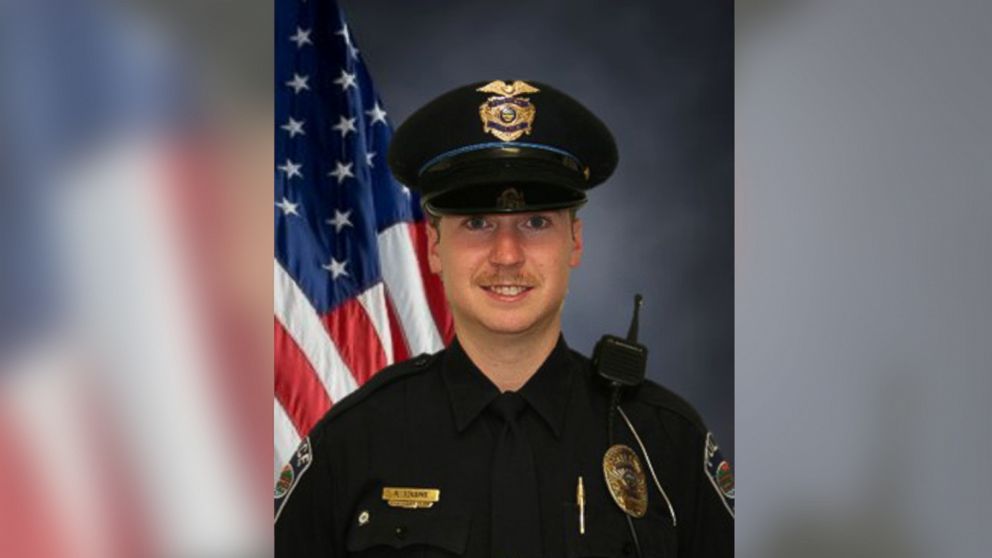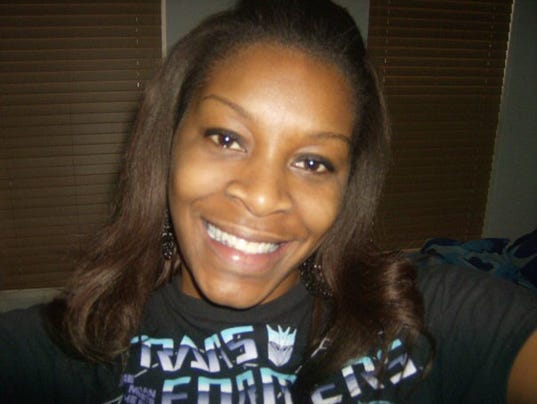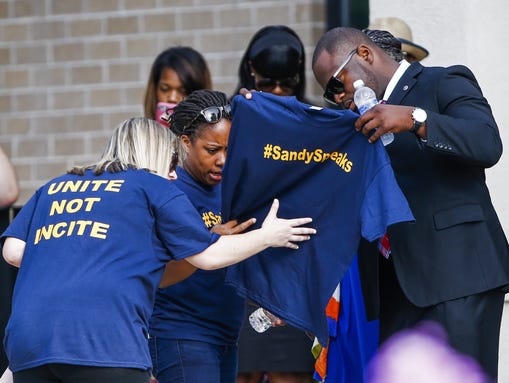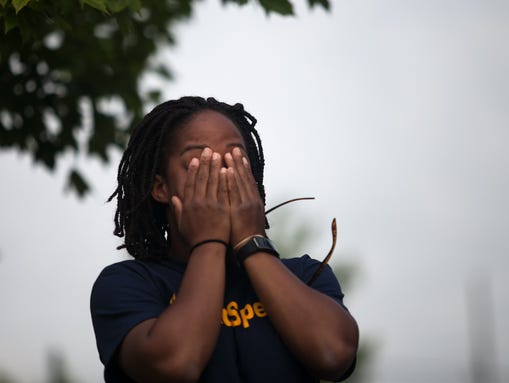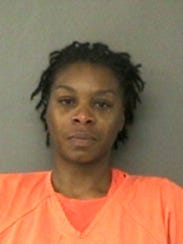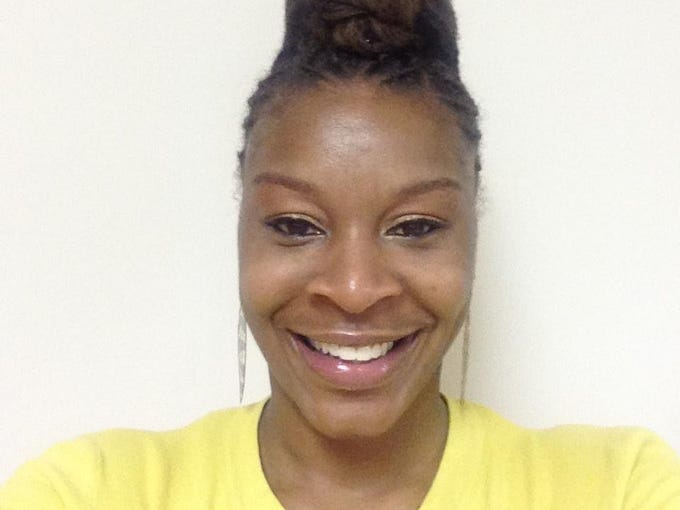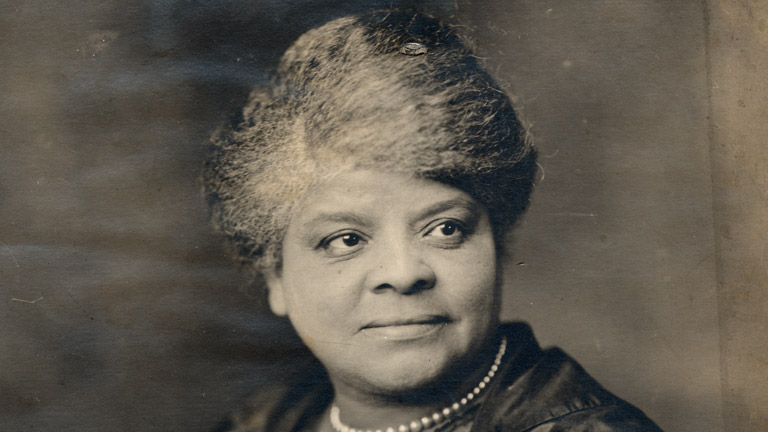
Ida Bell Wells-Barnett, more commonly known as Ida B. Wells, was an African-American journalist, newspaper editor, suffragist, sociologist, Georgist, and an early leader in the Civil Rights Movement.
Born: July 16, 1862, Holly Springs, MS
Died: March 25, 1931, Chicago, IL
Spouse: Ferdinand Barnett (m. 1895–1931)
Ida B. Wells documented lynching in the United States, showing that it was often used as a way to control or punish blacks who competed with whites, rather than being based on criminal acts by blacks, as was usually claimed by white mobs. She was active in women's rights and the women's suffrage movement, establishing several notable women's organizations. Wells was a skilled and persuasive rhetorician and traveled internationally on lecture tours.
Early life and education~ Ida Bell Wells was born a slave in Holly Springs, Mississippi in 1862, just before United States President Abraham Lincoln issued the
Emancipation Proclamation. Her father was James Wells, and her mother was Elizabeth "Lizzie" Warrenton Wells. Both parents were enslaved until freed under the proclamation.
Ida's father was a master at carpentry; he was a "race man" who worked for the advancement of blacks. He was very interested in politics and was a member of the Loyal League. He attended Shaw University in Holly Springs (now Rust College) but dropped out to help his family. He also attended public speeches and campaigned for local black candidates but never ran for office himself. Her mother was a cook for the Bolling household before her death from yellow fever. She was a religious woman who was very strict with her children.
Ida attended Shaw as well but was expelled for her rebellious behavior and temper after confronting the college president. While visiting her grandmother in the Mississippi Valley in 1878, Ida, then aged 16, received word that Holly Springs had suffered a yellow fever epidemic. Both her parents and her 10-month-old brother, Stanley, died in that event, leaving her and her five siblings orphaned.
Early career~ Following the funerals, friends and relatives decided that the six remaining Wells children should be split up and sent to various foster homes. Wells resisted this solution. To keep her younger siblings together as a family, she found work as a teacher in a black elementary school. Her paternal grandmother, Peggy Wells, along with other friends and relatives, stayed with her siblings and cared for them during the week while Wells was away teaching. Without this help, she would have not been able to keep her siblings together. She resented that in the segregated school system, white teachers were paid $80 a month and she was paid only $30 a month. This discrimination made her more interested in the politics of race and improving the education of blacks.
In 1883, Wells took three of her younger siblings to Memphis, Tennessee, to live with her aunt and to be closer to other family members. She also learned that she could earn higher wages there as a teacher than in Mississippi. Soon after moving, she was hired in Woodstock for the Shelby County school system. During her summer vacations she attended summer sessions at Fisk University, a historically black college in Nashville. She also attended LeMoyne. She held strong political opinions and provoked many people with her views on women's rights. At 24, she wrote, "I will not begin at this late day by doing what my soul abhors; sugaring men, weak deceitful creatures, with flattery to retain them as escorts or to gratify a revenge."
On May 4, 1884, a train conductor with the Memphis & Charleston Railway ordered Wells to give up her seat in the first-class ladies car and move to the smoking car, which was already crowded with other passengers. The year before, the Supreme Court had ruled against the federal Civil Rights Act of 1875 (which had banned racial discrimination in public accommodations). This verdict allowed railroad companies to continue racial segregation of their passengers.
Wells refused to give up her seat, 71 years before the activist Rosa Parks showed similar resistance on a Montgomery, Alabama, bus. The conductor and two men dragged Wells out of the car. When she returned to Memphis, she hired an African-American attorney to sue the railroad. Wells gained publicity in Memphis when she wrote a newspaper article for The Living Way, a black church weekly, about her treatment on the train. When her lawyer was paid off by the railroad, she hired a European-American attorney. She won her case on December 24, 1884, when the local circuit court granted her a $500 award.
The railroad company appealed to the Tennessee Supreme Court, which reversed the lower court's ruling in 1887. It concluded, "We think it is evident that the purpose of the defendant in error was to harass with a view to this suit, and that her persistence was not in good faith to obtain a comfortable seat for the short ride." Wells was ordered to pay court costs.
While teaching elementary school, Wells was offered an editorial position for the Evening Star in Washington, DC. She also wrote weekly articles for The Living Way weekly newspaper under the pen name "Iola" and gained a reputation for writing about the race issue. In 1889, she became co-owner and editor of Free Speech and Headlight, an anti-segregationist newspaper that was started by the Reverend Taylor Nightingale and was based at the Beale Street Baptist Church in Memphis. It published articles about racial injustice.
In 1889 Thomas Moss, a friend of Wells, opened the People's Grocery in the "Curve," a black neighborhood just outside the Memphis city limits. It did well and competed with a white-owned grocery store across the street. While Wells was out of town in Natchez, Mississippi, a white mob invaded her friends' store. During the altercation, three white men were shot and injured. Moss, and two other black men, named McDowell and Stewart, were arrested and jailed pending trial. A large white lynch mob stormed the jail and killed the three men.
After the lynching of her friends, Wells wrote in Free Speech and Headlight, urging blacks to leave Memphis:
There is, therefore, only one thing left to do; save our money and leave a town which will neither protect our lives and property, nor give us a fair trial in the courts, but takes us out and murders us in cold blood when accused by white persons.
Wells emphasized the public spectacle of the lynching. More than 6,000 blacks did leave Memphis; others organized boycotts of white-owned businesses. After being threatened with violence, she bought a pistol. She later wrote, "They had made me an exile and threatened my life for hinting at the truth."
Investigative journalism~ The murder of her friends drove Wells to research and document lynchings and their causes. She began investigative journalism by looking at the charges given for the murders. She also officially started her anti-lynching campaign. She spoke on the issue at various black women’s clubs, and raised more than $500 to investigate lynchings and publish her results. Wells found that blacks were lynched for such reasons as failing to pay debts, not appearing to give way to whites, competing with whites economically, and being drunk in public. She found little basis for the frequent claim that blacks were lynched because they had abused or assaulted white women. She published her findings in a pamphlet entitled "Southern Horrors: Lynch Law in All Its Phases." She wrote an article that suggested that, unlike the myth that white women were sexually at risk of attacks by black men, most liaisons between black men and white women were consensual. On May 27, 1892, while she was away in Philadelphia, a mob destroyed the offices of the Free Speech and Headlight in retaliation for her controversial articles.
Other studies have supported Wells' findings of lynching as a form of community control and analyzed variables that affect lynching. Beck and Tolnay's influential 1990 study found the following: "...Lynchings were more frequent in years when the “constant dollar” price of cotton was declining and inflationary pressure was increasing. Relative size of the black population was also positively related to lynching. We conclude that mob violence against southern blacks responded to economic conditions affecting the financial fortunes of southern whites—especially marginal white farmers."
Wells next spoke to groups in New York City, where her audiences included many leading African-American women. On October 5, 1892, a testimonial dinner held at Lyric Hall, organized by political activists and clubwomen, Victoria Earle Matthews and Maritcha Remond Lyons, raised significant funds for Ida B. Wells' anti-lynching campaign and led to the founding of the Women’s Loyal Union of New York and Brooklyn. Because of the threats to her life, she moved from Memphis to Chicago. Wells continued to wage her anti-lynching campaign and to write columns attacking Southern injustices. Her articles were published in The New York Age newspaper. Her writings continued to investigate the incidents that were referred to as causes for lynching black men.
Together with
Frederick Douglass and other black leaders, she organized a black boycott of the 1893
World's Columbian Exposition in Chicago, for its failure to collaborate with the black community on exhibits representing African-American life. Wells, Douglass, Irvine Garland Penn, and Ferdinand Lee Barnett wrote sections of a pamphlet to be distributed there: "Reasons Why the Colored American Is Not in the
World's Columbian Exposition." It detailed the progress of blacks since their arrival in America and also exposed the basis of Southern lynchings. Wells later reported to
Albion W. Tourgée that copies of the pamphlet had been distributed to more than 20,000 people at the fair. After the World's Fair in Chicago, Wells decided to stay in the city instead of returning to New York. That year she started work with the Chicago Conservator, the oldest African-American newspaper in the city.
Also in 1893, Wells contemplated a libel suit against two black Memphis attorneys. She turned to Tourgée, who had trained and practiced as a lawyer and judge, for possible free legal help. Deeply in debt, Tourgée could not afford to help but asked his friend Ferdinand Barnett whether he could. Born in Alabama, Barnett had become the editor of the Chicago Conservator in 1878. He was an assistant state attorney for 14 years. Barnett accepted the pro bono job.
Personal Life~ Wells kept track of her life through diaries; in them, she admits a few personal things. Before she was married, Wells admitted that she would only date men that she had “little romantic interest in,” because she didn’t want romance to be the center of the relationship. Instead she wanted it to be more about how she and her partner interacted mentally rather than physically. Wells also admitted to some flaws she had. She acknowledges that she was very quick to criticize and use harsh words towards someone. Because she would log in her diary all of her purchases, it was evident that she tended to buy items that she couldn’t actually afford.
In 1895, Wells married Ferdinand Barnett. She was one of the first married American women to keep her own last name as well as taking her husband's.
The couple had four children: Charles, Herman, Ida, and Alfreda. In her autobiography, A Divided Duty, Wells described the difficulty she had splitting her time between her family and her work. She continued to work after the birth of her first child, traveling and bringing the infant Charles with her. Although she tried to balance her world, she could not be as active in her work. Susan B. Anthony said she seemed "distracted". After having her second child, Wells stepped out of her touring and public life for a time, as she could no longer balance her job with her family.
Southern Horrors and The Red Record~ In 1892 she published a pamphlet titled Southern Horrors: Lynch Law in All Its Phases. Having examined many accounts of lynching based on the alleged "rape of white women," she concluded that Southerners concocted rape as an excuse to hide their real reason for lynchings: black economic progress, which threatened not only white Southerners' pocketbooks, but also their ideas about black inferiority. The notion of black economic progress was a contemporary issue in the South, where abstract Reconstruction laws often conflicted with real Southern racism.
The lesson this teaches and which every Afro-American should ponder well, is that a Winchester rifle should have a place of honor in every black home, and it should be used for that protection which the law refuses to give. When the white man who is always the aggressor knows he runs as great a risk of biting the dust every time his Afro-American victim does, he will have greater respect for Afro-American life. The more the Afro-American yields and cringes and begs, the more he has to do so, the more he is insulted, outraged and lynched.
The Red Record (1895) is a 100-page pamphlet describing lynching in the United States since the Emancipation Proclamation, while also describing blacks’ struggles since that event. The Red Record begins by explaining the alarming severity of the lynching situation in the United States (which was at a peak at the end of the 19th century). An ignorance of lynching in the U.S., according to Wells-Barnett, developed over a span of ten years during the Reconstruction era. Wells-Barnett talks about slavery, saying the black man’s body and soul were owned by the white man. The soul was dwarfed by the white man, and the body was preserved because of its value. She says that “ten thousand Negroes have been killed in cold blood, without the formality of judicial trial and legal execution,” therefore launching her campaign against lynching in this pamphlet, The Red Record.
Frederick Douglass wrote an article explaining three eras of Southern barbarism and the excuses that coincided with each. Wells-Barnett goes into detail about each excuse:
The first excuse that Wells explains is the “necessity of the white man to repress and stamp out alleged ‘race riots.’” Once the Civil War ended, there were many riots supposedly being planned by blacks; whites panicked and resisted them forcefully.
The second excuse came during the Reconstruction Era: blacks were lynched because whites feared “Negro Domination” and wanted to stay powerful in the government. Wells-Barnett encouraged those threatened to move their families somewhere safe.
The third excuse was: Blacks had “to be killed to avenge their assaults upon women.” Wells-Barnett explains that any relationship between a white woman and a black man was considered rape during that time period. In this article she states: “Nobody in this section of the country believes the old threadbare lie that Negro men rape white women.”
Wells-Barnett lists fourteen pages of statistics concerning lynching done from 1892 to 1895; she also includes pages of graphic accounts detailing lynchings. She credits the findings to white correspondents, white press bureaus, and white newspapers. The Red Record was a huge pamphlet, not only in size, but in influence.
Despite Wells-Barnett's attempt to garner support among white Americans against lynching, she felt her campaign could not overturn the economic interests whites had in using lynching as an instrument to maintain Southern order and discourage Black prosperity, specifically Black men's economic ventures. Ultimately, Wells-Barnett concluded that reason and compassion for the plight of the Negro would never appeal to Southern whites. This pessimism, however, was not defeating. Wells-Barnett came to conclude that perhaps armed resistance was the Negro's only defense against lynching. She launched efforts to gain support of such powerful white nations as Britain to shame and sanction the racist practices of America.
Wells and W. E. B. Du Bois
The lives of W. E. B. Du Bois and Ida B. Wells often ran along parallel tracks. Both used their journalistic writing to condemn lynching. Wells and Du Bois seemed to disagree on the story of why her name did not appear on the original list of NAACP founders. Du Bois implied that Wells had chosen not to be included. But, in her autobiography, Wells complains that Du Bois deliberately excluded her from the list.
Later public career~ Wells received much support from other social activists and her fellow clubwomen. In his response to her article in the Free Speech, Frederick Douglass expressed approval of her work: "You have done your people and mine a service...What a revelation of existing conditions your writing has been for me." Wells took her anti-lynching campaign to Europe with the help of many supporters. In 1896, Wells founded the National Association of Colored Women's Clubs, and also co-founded the National Afro-American Council.
In 1898, Wells was struggling to manage a home life and a career life, but she was still a fierce campaigner in the anti-lynching circle. This was illustrated when the National Association of Colored Women's club met that year in Chicago. To Wells' surprise, she was not invited to take part in the convention. When she confronted the president of the club, Mary Church Terrell, she was told that the women of Chicago wrote to say that if Wells were to take part in the club, they would no longer aid the association. Wells later learned that Terrell's own competitiveness played a part.
After traveling through the British Isles and the United States teaching and lecturing about the problem of lynching in the United States, Wells settled in Chicago and worked to improve conditions for its rapidly growing African-American population. People were starting to move out of the South to northern industrial cities in the Great Migration. Competition for jobs and housing caused a rise in social tensions because of the rapid changes. African-American migrants also competed with an expanding wave of rural immigrants from Europe, who were now in competition for jobs. Wells spent the last thirty years of her life in Chicago working on urban reform. She also raised her family and worked on her autobiography. After her retirement, Wells wrote her autobiography, Crusade for Justice (1928).
She never finished it; the book ends in the middle of a sentence, in the middle of a word. Wells died of uremia (kidney failure) in Chicago on March 25, 1931, at the age of 68.
Legacy and honors
Throughout her life, Wells was militant in her demands for equality and justice for African-Americans and insisted that the African-American community win justice through its own efforts. Since her death, interest in her life and legacy has grown.
Her life is the subject of Constant Star (2006), a widely performed musical drama by Tazewell Thompson. The play sums her up:
...A woman born in slavery, she would grow to become one of the great pioneer activists of the Civil Rights movement. A precursor of Rosa Parks, she was a suffragist, newspaper editor and publisher, investigative journalist, co-founder of the NAACP, political candidate, mother, wife, and the single most powerful leader in the anti-lynching campaign in America. A dynamic, controversial, temperamental, uncompromising race woman, she broke bread and crossed swords with some of the movers and shakers of her time: Frederick Douglass, Susan B. Anthony, Marcus Garvey, Booker T. Washington, W. E. B. Du Bois, Frances Willard, and President McKinley. By any fair assessment, she was a seminal figure in Post-Reconstruction America.
In 1941, the Public Works Administration (PWA) built a Chicago Housing Authority public housing project in the Bronzeville neighborhood on the south side in Chicago; it was named the Ida B. Wells Homes in her honor. The buildings were demolished in August 2011.
On February 1, 1990, the United States Postal Service issued a 25 cent postage stamp in her honor.
In 2002, Molefi Kete Asante listed Wells on his list of 100 Greatest African Americans.
In 1995, AUDELCO (Audience Development Committee Inc.), the organization that honors black theater, bestowed four awards on "In Pursuit of Justice: A One-Woman Play About Ida B. Wells" written by Wendy Jones and starring Janice Jenkins. With the exception of letters to a fictional friend, Leonora, the play is based on historical incidents and speeches from Ida B. Wells-Barnett’s autobiography.
On July 16, 2015, Google's Doodle celebrated Wells' Birthday.

Ida B. Wells, Anti-Lynching Crusader and Mother of Intersectionality
